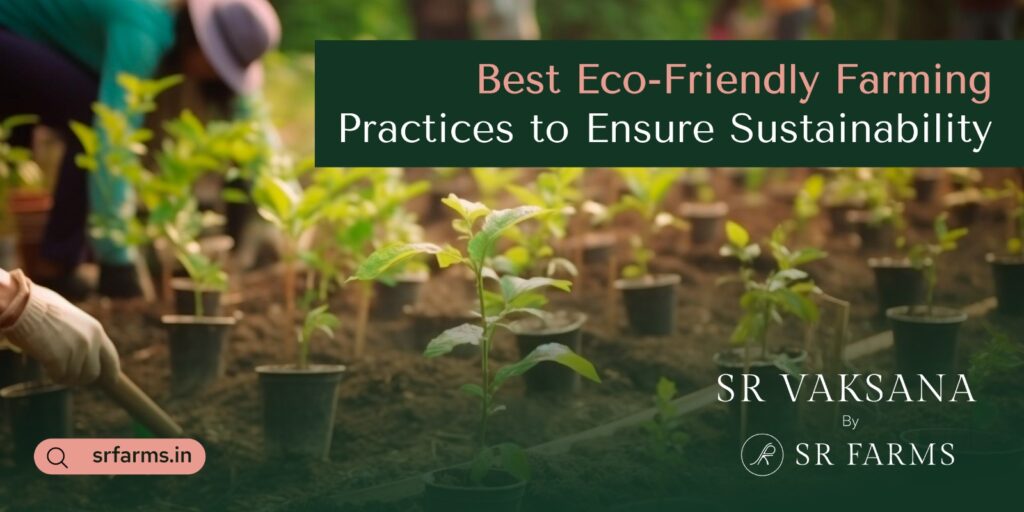Land is our most precious wealth, and protecting it is our duty. Abraham Lincoln once said, “The greatest fine art of the future will be the making of a comfortable living from a small piece of land.” With the ever-growing population and increasing demand for food, it has become imperative to adopt eco-friendly farming methods to ensure the long-term health of our planet. This blog delves into the realm of sustainable farming practices, exploring various strategies that contribute to a greener and more sustainable future.
We have all heard about sustainable development, but what is sustainability in agriculture?
Sustainable agriculture requires profitable operations while preserving resources, achieved through optimising yields and managing financial risks.
Sustainable farming prioritises environmental stewardship by conserving natural resources like healthy soil, water, and biodiversity.
Sustainable farming emphasises social responsibility, ensuring farming practices benefit communities and support local economies.
Sustainable agriculture demands innovation and collaboration among farmers, investors, researchers, policymakers, and consumers to create a resilient food system.
In essence, sustainability in agriculture is about finding harmony between economic prosperity, environmental health, and social equity. By adopting sustainable farming practices, we can ensure that agriculture continues to thrive while also safeguarding the planet for generations to come.
Sustainable farming is only achievable through eco-friendly practices. It is the only way forward, and the only way we can keep our land fertile and biodiversity safe.
Below is a list of important eco-friendly farming practices and their benefits, aimed at preserving biodiversity, conserving water, and maintaining a balanced ecosystem. SR Vaksana stands as one of the best-managed farmlands near Doddaballapur and is committed to practicing environmentally conscious agriculture.
Organic farming avoids synthetic fertilisers and pesticides, reducing chemical runoff and soil pollution while enhancing soil health and fertility through practices like composting and crop rotation. Additionally, it promotes biodiversity by preserving natural habitats and supporting diverse ecosystems.
Agroforestry integrates trees and shrubs into agricultural landscapes, providing multiple benefits such as improving soil structure and fertility, reducing erosion, and enhancing water retention. Moreover, it sequesters carbon dioxide from the atmosphere, mitigating climate change impacts.
Rotational grazing involves rotating livestock across pastures to prevent overgrazing and soil degradation, stimulating grass growth, improving soil health, and reducing nutrient runoff into waterways. It also enhances biodiversity by mimicking natural grazing patterns and promoting a diverse range of plant species.
Integrated Pest Management (IPM) utilises biological controls, cultural practices, and targeted pesticide use to manage pests while minimising reliance on chemical pesticides and reducing harm to beneficial insects and ecosystems. Furthermore, it preserves natural pest predators and promotes ecological balance in agricultural ecosystems.
Cover cropping entails planting cover crops during fallow periods to protect and improve soil health, suppress weeds, reduce soil erosion, and enhance soil organic matter content. It also increases water infiltration and retention, improving drought resistance and overall resilience.
Conservation tillage reduces soil disturbance and erosion by minimising or eliminating ploughing and tilling, preserving soil structure and organic matter, and decreasing fuel consumption and greenhouse gas emissions associated with tillage operations.
Permaculture involves designing agricultural systems that mimic natural ecosystems, maximising resource efficiency and diversity. It incorporates principles such as companion planting, polyculture, and perennial crops to create resilient and self-sustaining systems.
Aquaponics and hydroponics utilise water-based systems to grow crops without soil, minimising water usage and environmental impact. They integrate fish farming (aquaculture) with hydroponic plant cultivation, creating a symbiotic relationship that recycles nutrients and minimises waste. It keeps the land fertile and healthy.
Renewable energy integration harnesses renewable energy sources such as solar, wind, and biogas to power farm operations, reducing reliance on fossil fuels, mitigating greenhouse gas emissions, and reducing environmental pollution.
Community Supported Agriculture (CSA) connects consumers directly with local farmers, promoting sustainable farming practices, reducing food miles, enhancing food security, strengthening local economies, and fostering community engagement and support for sustainable agriculture.






















